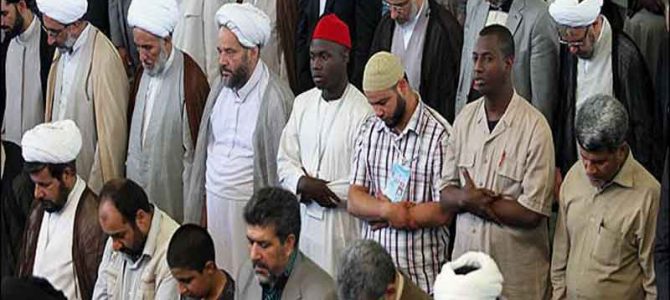Question 334: Salam all. Why Different sects of Muslims have different ways of prayers???
Answer 334: According to Shia and Sunni, there are some different ways of offering prayers like praying with closed hands or combining the Noon and Afternoon prayers. The main reasons why Ahlul Sunnah offer their prayers so differently, are a few traditions have been narrated from the holy Prophet (pbuh) as well as bid’ah ruled by the second Khalifah.
Sunnis argue that it has been reported that the Prophet (S) performed Zuhr and Asr prayers separately creating a time gap in between the two prayers. But Shiites are of the view that this is simply a Sunnah (lit. tradition) and a practical tradition or normative conduct of the Prophet does not and cannot prove the necessity of this act; in fact, it can imply necessity, desirability and allowableness (ibaha) of something and if one has to apply the Prophet’s normative conduct to necessity, he has to present a separate evidence.[1]
Shiites, however, not only maintain that Sunni stance concerning impermissibility of combining prayers is not defendable but they also have solid proofs for their own argument. Shiites make recourse to a number of narrations which clearly refer to combining the Zuhr and Asr prayers on the part of the Holy Prophet (S) himself.[2]
Praying with closed hands is a method that didn’t exist during the prophet’s time, because the prophet (pbuh) himself would pray with open hands, and since the Shia solely believe in following the prophet (pbuh) and the imams (as) in all fields, they also pray with open hands, and regard praying with closed hands as bid’ah or forbidden innovation. This method of praying was innovated during the second khalifah’s rule, became the formal prayer style then[3], and was continued till today, to the extent that most Sunnis still pray the way the second khalifah had ordered in his time[4]. But the imams (as) have said that this method resembles that of the kafirs and the Maji and have asked their followers to pray with open hands; the same way the prophet (pbuh) would pray.
For further information in this regards, please read to the following answers:
Index: Prayer Time: The Due Time for Obligatory Prayers, answer 199.
Index: Saying Āmīn during prayer in validate the prayer, answer 017.
Index: Takattuf: Praying with closed hands, answer 016.
Index: Number of things which invalidate the prayer, answer 547.
Index: Offering congregational prayers behind a Sunni Imam, answer 237.
Index: The differences and similarities between Shia and Sunni, answer 187.
[1] . Group of authors, prepared by Pour Amini, Muhammad Baqir, The Holy Prophet: Normative Conduct and History, p. 172, Supreme Leader’s Representative Office in Universities, Ma’aref Publications’ Office, first edition, 1385 (Persian calendar).
[2] . “ جمع النبیصلی الله علیه و آله و سلم بین الظهر و العصر وبین المغرب و العشاء فقیل له فی ذلک فقال صنعت هذا لئلا تحرج أمتی ” Zarqani’s commentary on Malek’s Mowte’, vol. 1, the chapter on performing prayers together both when travelling and when not, pg. 294; Al-Nawawi, Abu Zakariyya, Sharh Sahih Muslim Al-Nawawi, vol. 5, pp. 213-218, the chapter on performing prayers together when not travelling; “ إذا زالت الشمس فقد دخل وقت الظهر و العصر جمیعا إلا ان هذه قبل هذه، ثم أنت فی وقت منهما جمیعا حتی تغیب الشمس ” Wasa’elul-Shia, vol. 4, the chapters on prayer times, chapter 4, hadiths 4 and 6, the Jame’ul-Ahadith software; “ زالت الشمس دخل الوقتان الظهر و العصر و إذا غابت الشمس دخل الوقتان المغرب والعشاء الآخره ” Wasa’elul-Shia, vol. 4, pg. 183, chapter 17-Ibid, vol. 4, pg. 126, the chapters on prayer time, chapter 4, hadith 1, the Jame’ul-Ahadtih software; “ ان رسول اللّه – صلى اللّه علیه [ و آله ] و سلم – جمع بین الصلاه فى سفره سافرها فى غزوه تبوک فجمع بین الظهر و العصر , و المغرب و العشاء . قال سعید :فقلت لابن عباس : ما حمله على ذلک ؟ قال : اراد ان لا یحرج امته ” Al-Siratul-Mustaqim, vol. 3, pg. 291.
[3] . Sahl ibn Sa’d’s hadith on this matter that Bukhari has narrated is good proof for this claim: “The people were told that men should put there right hand on their left arm in prayer” (Fathul-Bari fi Sharh Sahihil-Bukhari, vol.2, pg.224) because if the prophet (pbuh) had ordered the people to do so, the hadith would have said that the prophet (pbuh) had ordered them, not that “the people were told…”.
[4] . The Hanafiyyah, Shafi’iyyah and Hanabilah all consider closing the hands mustahabb, while the Malikiyyah consider it wajib (Al-Fiqh alal Madhahibil-Khamsah, pg.110).

